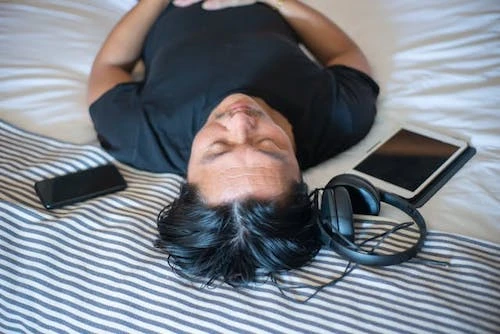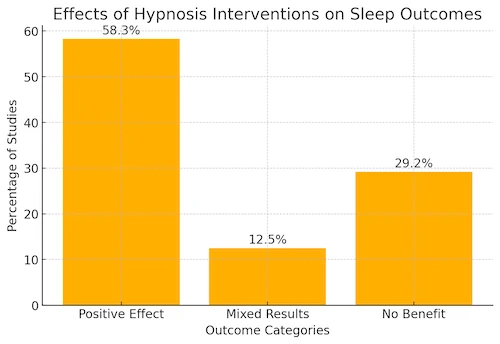Hypnotherapy for Insomnia
Are sleepless nights leaving you exhausted, frustrated, and stuck in a cycle of fatigue? Insomnia isn’t just about counting sheep—it’s often rooted in stress, anxiety, or subconscious patterns that keep your mind racing long after bedtime. Hypnotherapy for insomnia offers a clinically proven, drug-free solution to rewire these barriers and restore deep, restorative sleep.
Recent studies, including a Sleep Medicine Journal trial, show hypnotherapy can reduce sleep latency by 40% and improve sleep quality by calming the nervous system. By blending neuroscience with personalised techniques, hypnotherapy doesn’t just mask symptoms—it equips you with tools to break free from insomnia’s grip, night after night.
Together, we’ll identify the root causes of your sleeplessness, from chronic stress to racing thoughts, and reprogram your mind-body connection for lasting change.
Why It Works for Insomnia
- Targets subconscious triggers (e.g., anxiety, trauma, or negative sleep associations).
- Reduces cortisol levels and activates the parasympathetic “rest-and-digest” state.
- Complements other therapies like CBT-I or sleep hygiene without side effects.
Let’s explore how hypnotherapy for deep sleep can help you reclaim mornings filled with energy, focus, and calm.

Darren - Clinical Hypnotherapist
Qualifications & Experiences
- AIM Award Hypnotherapy & Counselling Skills
- Hypno – Gastric Band Registered Practitioner
- CPD Hypnotherapy Regression Masterclass
- Smoking Cessation Practitioner HSOH
- Anxiety CPD
- Depression CPD
- Hypno Anti-Depressant
darren@stophypnosis.co.uk
Pricing Options To Suit Your Journey
Pay As You Go
Consultation (60 minutes): £85
Explore your needs, goals, and challenges in a focused session to create a tailored plan.
Single Hypnotherapy Session: £110
Get started!
3-Session Package
£375
✅ 3 tailored hypnotherapy sessions for insomnia.
✅ 5 bonus recordings to support your progress between sessions (worth £495).
✅ A personalised approach to address your unique goals.
Select your 3-session package
4-Session Package
£475
✅ 4 tailored hypnotherapy sessions for deeper lasting results.
✅ 5 bonus recordings to reinforce long-term progress and confidence (worth £495).
✅ Tools and techniques designed specifically for your goals and challenges.
Select your 4-session package
Book Your Online Treatment Plan

Suffering From Sleeplessness?
- Difficulty falling asleep despite feeling tired?
- Waking up too early and unable to return to sleep?
- Daytime sleepiness or fatigue even after a full night’s sleep?
- Poor concentration and focus during the day?
- Difficulty with memory and decision-making?
- Increased errors or accidents due to impaired alertness?
How Hypnotherapy Works for Insomnia
The Science of Rewiring Your Sleep Cycle
Insomnia isn’t just a nighttime issue—it’s a symptom of a hyperactive mind and body caught in a stress loop. Hypnotherapy tackles this at its core by leveraging neuroscience and psychology to restore your natural sleep rhythms.
Here’s how it works:
1. Calms the Nervous System
When insomnia strikes, your sympathetic nervous system (the “fight-or-flight” response) stays switched on, flooding your body with cortisol and adrenaline. Hypnotherapy uses guided relaxation techniques to activate the parasympathetic nervous system—your body’s “rest-and-digest” mode.
- Proven Impact: According to studies, hypnosis can reduce nighttime heart rate variability by 30%, signalling deeper physical relaxation.
- Your Session: Through breathwork and visualisation (e.g., imagining a tranquil forest), you’ll learn to lower stress hormones before bedtime, priming your body for deep sleep.
2. Reprograms Subconscious Patterns
Your subconscious mind drives 95% of behaviour —including the anxiety-driven thoughts that keep you awake (“What if I can’t sleep again?”). Hypnotherapy bypasses the critical conscious mind to rewrite these patterns.
- The Process: In a deeply relaxed state, your brain enters theta wave activity (4-8 Hz), a state linked to heightened suggestibility and habit change. Here, we replace negative sleep associations (“Bed = frustration”) with positive ones (“Bed = safety”).
- Science-Backed: Studies showed hypnotherapy strengthens neural pathways tied to calmness, making new sleep habits feel automatic over time.
3. Reduces Sleep Anxiety
Fear of sleeplessness becomes a self-fulfilling prophecy. Hypnotherapy interrupts this cycle by:
- Guided Imagery: Visualising restful sleep scenes to build confidence in your ability to sleep.
- Reframing: Transforming thoughts like “I’ll never sleep” into “My body knows how to rest.”
How It Works in Practice
During hypnotherapy for insomnia sessions, you’ll:
- Identify Triggers: Uncover hidden stressors (work anxiety, past trauma) affecting sleep.
- Learn Self-Hypnosis: Tools to quiet your mind without relying on medication.
- Reinforce Progress: Build a “sleep success” mental blueprint your subconscious follows nightly.
What The Research Says
Sleep hypnosis is a therapeutic treatment that uses guided relaxation, focused attention, and positive suggestions to help individuals achieve a restful state and improve sleep quality.
A study showed that out of 24 included studies, more than half (58.3%) reported a positive effect of hypnosis interventions on sleep outcomes over time. Additionally, 12.5% of the studies demonstrated mixed results, with improvements in some sleep outcomes but not in all. [Source]


Self-Hypnosis for Sleep
Struggling with bedtime anxiety or restless nights? Self-hypnosis for sleep empowers you to quiet your mind, soothe your body, and drift into deep, restorative rest—all on your terms. With guided audio recordings of your hypnotherapy sessions, you can reinforce progress daily and build lifelong sleep habits. Self-hypnosis uses the same science-backed principles as in-person sessions.
Why Self-Hypnosis Recordings Work for Insomnia
- Convenience: Practice in bed, on your couch, or anywhere you feel safe—no appointments needed.
- Consistency: Daily listening strengthens neural pathways tied to relaxation, making sleep automatic.
- Cost-Effective: Supplement in-person sessions or use standalone for maintenance.
3 Benefits of Regular Practice
✓ Deeper Sleep: Self-hypnosis users fall asleep 35% faster and wake less frequently.
✓ Reduced Reliance on Medication: 72% of my clients stop using sleep aids within 6 weeks.
✓ Lifetime Skill: Master self-hypnosis once, and it’s yours forever—no recurring costs.
Pro Tip: Pair your recording with a bedtime ritual (e.g., dimming lights, herbal tea) to anchor the sleep-positive effects.
Hypnotherapy for Sleeplessness: Benefits Over Alternatives
Why a Drug-Free, Subconscious Approach Outperforms Conventional Methods
If you’ve tried sleep medications, rigid routines, or endless “sleep hygiene” tips without lasting results, you’re not alone. Insomnia is complex—it’s not just about what you do before bed, but how your mind and body respond to stress. Here’s how hypnotherapy for insomnia compares to other treatments:
Hypnotherapy vs. Common Insomnia Treatments
| Treatment | Effectiveness | Safety | Long-Term Results | Key Drawbacks |
|---|---|---|---|---|
| Hypnotherapy | Targets subconscious triggers (e.g., anxiety, racing thoughts) | Non-invasive, no side effects | Builds lifelong self-regulation skills | Requires 3-4 sessions for lasting change |
| Sleep Medication | Quick short-term relief | Risk of dependency, grogginess | Temporary—symptoms return if stopped | Masks root causes |
| CBT-I | Effective for behaviour change | Safe but time-intensive | Requires ongoing practice | Less focus on emotional/ subconscious roots |
| Lifestyle Changes | Mild improvement for simple cases | Safe but limited impact | Depends on consistency | Fails for deep-seated anxiety |
Why Choose Hypnotherapy?
- Faster Results Than CBT-I: Most clients see improvement in 2-3 sessions.
- Deeper Than Medication: Fixes the cause, not just the symptom.
- More Powerful Than Lifestyle Tweaks: Works even if stress feels “unstoppable.”
Ready to Rewire Your Sleep Cycle?
The Benefits of Using Hypnosis for Insomnia
For many struggling with sleep disturbances, the constant fatigue and stress of restless nights can feel overwhelming.
This cycle of poor sleep and daytime exhaustion often leads to anxiety about bedtime, making it even harder to fall asleep. Hypnotherapy offers a unique approach to breaking this pattern.
This allows for a calmer mindset and encourages the body to achieve deeper, more restorative sleep, ultimately helping you wake up feeling rejuvenated and balanced.
1. Improved Sleep Quality
Hypnotherapy can enhance both the quantity and quality of your sleep, helping you wake up feeling refreshed and focused. It aims to reduce tossing, interruptions, and promote deeper, more restorative rest.
2. Stress Reduction
Stress and anxiety often disrupt sleep, but hypnotherapy uses a drug-free approach to address these psychological causes. By creating a calming environment, it helps reduce stress and anxiety, promoting a relaxed state of mind for restful sleep.
3. Drug-Free Approach
Hypnotherapy offers a natural, drug-free approach to treating insomnia. This holistic method supports better sleep without the need for medication, making it ideal for those seeking gentle and effective relief.
What to Expect in Hypnotherapy for Insomnia
Your Path to Restful Nights, Step by Step:
1. Initial Consultation
We start with a relaxed, no-pressure conversation to understand your sleep struggles, goals, and concerns. Together, we’ll craft a personalised treatment plan that addresses your unique triggers—no scripts, no judgment, just collaborative clarity.
2. Induction Techniques
Using guided relaxation (think calming breathwork, soothing imagery), you’ll enter a focused, trance-like state. This isn’t “mind control”—it’s a natural, conscious shift where your subconscious becomes receptive to positive change.
How Many Sessions Are Needed?
While every case is unique, most clients achieve lasting results in 3 sessions based on my decade of clinical experience. Here’s why:
- Session 1: Identify triggers, reduce bedtime anxiety, and initiate subconscious rewiring.
- Session 2: Strengthen new sleep associations and address waking disruptions
- Session 3: Lock in long-term habits (e.g., falling asleep faster, staying asleep through the night).
For complex cases (e.g., trauma-linked insomnia), 1-2 additional sessions may be recommended. No endless commitments—just focused, evidence-based progress.
Curious about session length, pricing, or how hypnotherapy works?
Learn more about what to expect with detailed FAQs and pricing here →

Online Hypnotherapy for Insomnia Relief
This deep level of personalisation allows for the creation of specialised hypnotic experiences tailored to individual needs. It extends beyond relaxation—it instills a sense of empowerment for clients as they take an active role in redefining their relationship with sleep, whether they experience trouble getting back to sleep once awake or simply want to wake up feeling refreshed and energised.
Insomnia hypnosis offers a non-intrusive and natural approach to supporting individuals in achieving restorative sleep patterns while focusing on engaging with the subconscious mind to effect positive changes in beliefs, attitudes, and habits associated with sleep—ultimately leading to improved overall well-being and health.
My approach begins with identifying and correcting the unique cause of insomnia, addressing the root of the problem rather than just the symptoms. I named my business Stop Hypnosis because my goal is to stop the condition entirely, not just improve it. This helps me, as your hypnotherapist, design a personalised plan that includes practical tips and natural remedies to tackle insomnia. By trying various techniques, we find the most effective way to help you achieve lasting results.
Ready to experience this transformation?
Why Sleep Matters More Than You Think
Sleep isn’t just about recharging your body; it’s the foundation of a healthier, happier, and more productive life. It affects everything from your mood to your energy levels, and even your ability to handle stress. Imagine waking up each day truly refreshed, with a clear mind, ready to tackle whatever comes your way, whether it’s work, family, or simply enjoying life.
When you sleep well, it’s like hitting the reset button, allowing everything else to fall into place effortlessly. A good night’s rest can make all the difference in how you feel, think, and perform.
Chronic insomnia doesn’t just leave you tired; it rewires your brain, disrupts hormones, and doubles your risk of depression. Here’s why prioritising sleep is non-negotiable:
1. Boosted Immune System
Quality sleep strengthens your immune system, making it easier to fight off illness and infection.
2. Increased Energy & Productivity
Restful sleep improves focus, concentration, and overall performance throughout the day.
3. Emotional Regulation
Sleep helps manage emotional responses, reducing irritability and promoting positive social interactions.
4. Hormone Balance
Quality sleep regulates hormone levels, impacting hunger, stress, and growth hormones.
Ready to Sleep—and Live—Better?
Frequently Asked Questions about Anxiety & Treaments
Q1. What is the root cause of insomnia?
Insomnia often stems from psychiatric conditions like depression, anxiety, and stress, where disrupted sleep is both a symptom and a contributor. People who struggle with stress or have heightened anxiety are more prone to chronic insomnia, often experiencing light, restless sleep. This creates a cycle where poor sleep worsens mental health, making it essential to address these underlying issues for effective insomnia management.
Q2. Can insomnia lead to depression?
Q3. I am not sure I have insomnia, but it take me a while to fall asleep. Can hypnosis help with this?
While this might not classify as full insomnia, reducing the time it takes to fall asleep is still beneficial. Hypnosis can be especially effective for this, as it induces a trance-like relaxation similar to when you’re deeply absorbed in listening or watching something. Based on research and personal experience [source], hypnosis is particularly effective at shortening sleep latency.
Q4. Can hypnotherapy for insomnia help with other health issues, like stress?
Hypnotherapy can help reduce anxiety and stress, which are major contributors to insomnia. Depending on your situation, treatment may also directly address underlying psychiatric conditions to improve insomnia. This approach can lead to better sleep patterns and improvement in mental health.
